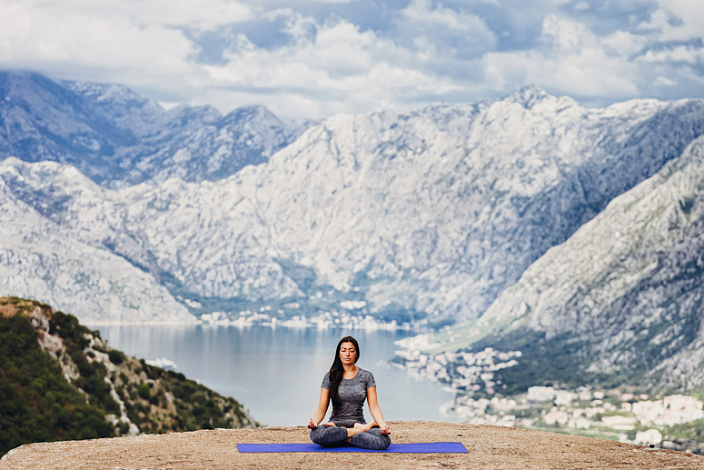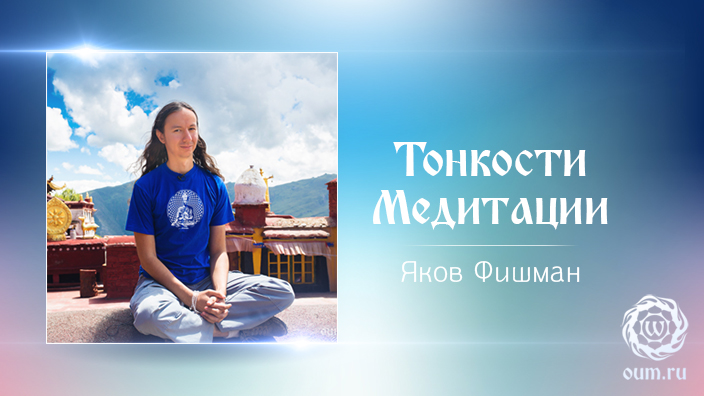Do you care about the future? Build today. You can change everything. Grow a cedar forest on a barren plain. But it is important that you do not construct cedars, but plant seeds.
Antoine de Saint-Exupery
NSThe beauty of meditation is that it can give us so much. In turn, we need an understanding of the practice, regular diligence and the right motivation. It would seem that everything is very simple. But it is not so. If you have already tried meditation, then, most likely, you managed to make sure that:
- firstly, it may not be easy to sit down and start practicing, as there are many other important and not so important things around;
- secondly, even if it was possible to start a lesson, calming the mind is not an easy task, fraught with various obstacles.
But you shouldn’t despair. If you can’t overcome these obstacles right away, you don’t need to say that meditation is not yours. If you were to immediately give up in your life what you didn’t succeed after a few tries, you may never have learned to walk and do a lot of other things.
In this article, we will look at how to find the strength to cope with the first difficulty: when you just can’t sit down and start practicing.
Difficulties give rise to the ability in a person to overcome them.
W. Phillips
The obstacles that we may encounter during the lesson are possible for different reasons. Some of them are obvious, others are hidden in our actions or inaction in the past. For example, if we went to bed at 2 am and woke up at 5 am on the alarm clock, it would be no surprise that we start nodding off during the meditation session. On the other hand, if we get great sleep and feel energized during any exercise, but as soon as we sit on the practice mat, after a couple of minutes we start to turn off, then everything is not so obvious.
In one of his wise songs, the great practitioner of the past, the Tibetan yogi Milarepa, said that the drowsiness and restlessness of the mind, which regularly arise in practice, is a consequence of the bad deeds of the past; and in order to overcome this negative tendency, it is necessary to do more good deeds by accumulating merit.
One of the stories that has come down to us from the time of the Buddha illustrates this well. Buddha’s disciples had the Pantaki brothers. The elder was very smart, and the younger was completely unable to remember any instructions, although he tried very hard. Buddha was able to find the right words for everyone, but despite the fact that in order to immerse himself in the essence of things, he asked his younger brother to simply sweep the floor and repeat: “Sweep the dust, clean out the dirt,” he could not even remember these words. Then the Buddha realized that he lacked good merit, and asked him to clean the sandals of other monks. Younger brother Pantaka began to carry out with zeal the task of the Buddha and after a while, finally remembering his “mantra”, began to sweep the floor and repeat: “Sweep away the dust, clean up the dirt.” And after some time, I realized that the dust is the defilements lurking within us, and by practicing, we are able to get rid of them, remove the veils of ignorance.
Now let’s look at what to do if you just can’t get to the rug, finding yourself a lot of other things to do and excuses. It seems to you that tomorrow or in the more distant future everything will be different and you will definitely find time in your filled schedule, find the inner resources to cross your legs and immerse yourself in your own breath.
Unfortunately, very often plans remain an unfulfilled list in the diary. One of the reasons lies in the fact that we can very vaguely imagine the future and our real possibilities in it. Modern research suggests that when we think about ourselves in the present and then begin to imagine the future self, we use different parts of the brain, as if we are thinking about another person. This gives us the opportunity to hang on our future version a bunch of tasks, cases that we always postpone for later, but in fact overestimate its capabilities. After all, if you want to learn something and change something in yourself, you need to start today! Help your future self now.
Our future is uncertain. You can go to a fortune teller and try to determine with her help whether you will have the opportunity to practice in a year if you do not start doing it in the present. But it is better to listen to the wise Milarepa, who said: “It is not known what will come tomorrow: a new day or a new life,” and start today. But how? Next, we’ll look at various techniques to help you.
First of all, you need to think about your motivation for practice, since success will largely depend on it. If classes are just a tribute to fashion, then the difficulties that have arisen can easily scare you off.
If you answer the questions: why are you going to spend precious minutes of your life on meditation; what the development of awareness, inner peace and harmony can give you and those around you – this will undoubtedly help to find time for more persistent and regular exercises. The more sublime motivation you find for yourself, the easier it will be to practice. For example, the motivation to “learn to control your emotions and mind in order to be able to help your loved ones” will be more altruistic and sublime than the desire to “prove to your friends that you are a spiritual person”.
Motivation is the foundation of the practice that will allow you to continue moving along the chosen path.
Try to take the time to determine your motivation. It can change and improve over time. If for the time being you intend to practice meditation for inner calmness so that fewer wrinkles appear, so be it. But be sure to remember this motive for practice to help yourself realize your plans, and remember it before each session. This will help you tune in.
Perhaps the following words of the Dalai Lama will motivate you:
Every day, as soon as you wake up, think: “Today I was lucky enough to wake up, I am alive, I have a priceless human life, and I am not going to waste it. I will use all my energy to develop myself, open my heart to other people, achieve enlightenment for the benefit of all living beings. I will think only good of others, I will not allow myself to be angry or think bad of someone, I am going to be useful to people as much as I can.
Having made a plan for the day and indicated in the diary “practice of meditation from 9: 30-10: 00”, we can easily postpone it for later if one of the millions of things comes up. After all, this is just meditation. But if you write in your diary that from 9: 30-10: 00 you are scheduled to meet with Buddha, it will not be very correct to postpone it.
There are urgent matters, there are important things, but there are just small tasks that often consume the bulk of our time. As our inner guide, we must gradually learn to prioritize correctly. After developing the skill of concentration, we will be better able to cope with other things, make fewer mistakes, which will save us a lot of energy and time, since we will not have to correct them. It turns out that the practice of meditation is a very beneficial contribution, which will give a good percentage.
Less is better, but more often. This motto fits very well with the practice of meditation. Regularity is the foundation of progress. But if you set yourself “Hercules” goals, for example, that you will meditate for 1.5 hours a day, then your mind will get scared and will do everything possible so that you do not succeed. Do not set yourself maximum goals, start with realistically achievable ones. Get used to them, and then the meditation time can be increased. Once you get past a certain point, you can make the practice of calming your mind a good habit. But, if at some point you feel that the chosen time has become a burden, do not stop training completely, just slightly reduce the time of one approach.
This is a very good way to trick your mind. For example, instead of meditating, you suddenly want to eat a portion of the pie. In order to strengthen willpower and endurance, which are gradually pumped, like any muscle, and still fulfill what was originally conceived, try to explain to your mind that you will sit down to meditate for only 10 minutes, and after this period you will happily eat an appetizing pie. It would seem that 10 minutes is not a lot at all. But often this can be enough to get involved in a priority business, remember your motivation and your goals, and the state of mind will have time to change. Perhaps 10 minutes will turn into 20. Not succumbing to the temptation of the moment, you will become stronger and wiser. The future self will be proud of you. It is important to mention that even short approaches to meditation trigger a process of inner change. Regular, albeit short, exercises create new neural connections, help you become more attentive and get closer to the goal that you set for yourself. So if the mind tries to outwit you by complaining that time is short, there is nothing to start, know that it is not.
When you feel very tight, everything turns against you and it seems that there is no strength to endure a single minute more, do not retreat for anything – it is at such moments that a turning point in the struggle comes.
Beecher Stowe
Try to find a place to meditate in your room. It doesn’t have to be a separate room: not everyone can afford it. Choose a corner to practice in regularly. You can place items there that energize and motivate you. This will help form a new healthy habit. Gradually, this corner will become your own place of strength, once in which, you will feel calm and ready to leave worries for a while, even in moments of weakness.
The ability to control oneself, or willpower, becomes weaker in the evening. She can also get tired, like the hand that wrote a lot today, especially if you haven’t had time to train her yet. In order not to leave yourself a chance to back down in the evening, take some time to meditate in the morning.
Many stories have survived to this day about the practices of the past, who steadfastly overcame various difficulties on the spiritual path. Often, their path was more thorny, and the trials far exceeded the dilemma facing us: to plunge into the Internet for an extra hour or still sit down and meditate. It was not easy for them, but they coped. Reading such stories inspires your own exploits. But contagious examples are found not only in the past. Perhaps there are people around you who will help you get off the couch and get busy. And if they are not yet there, try to find such friends and make them a part of your life. Then the Internet can become your assistant, because it is not necessary that the inspirers live with you in the same city.
If you want a strong case, you’re in luck. Neuroscientists have conducted a large amount of research and ample evidence that meditation improves the quality of life.
I think it will be interesting for you to know that meditation itself is a tool for training willpower. By meditating, you develop not only this skill, but also the skill of self-control, composure, the ability to respond to stressful situations. During meditation, the amount of gray matter in the brain increases in the prefrontal cortex and other areas of the brain that are responsible for self-awareness, helping us make the right decisions based on our global priorities and goals, bypassing momentary temptations. That is, if you have bad and distracting habits that prevent you from moving along the chosen path, the practice of meditation will help you gradually cope with them. It will be easier for you to refuse the 10th episode of the “Mahabharata”, which you watch without stopping, or from the same 10 cookies.
Don’t believe me? Then be sure to check it out on your own experience!
For the most part, the listed recommendations can be applied to various life tasks for which there is not enough time yet.
The author of the article: Alena Chernyshova







